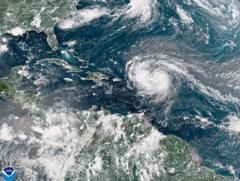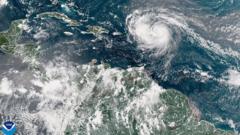Hurricane Erin has rapidly escalated into a category five hurricane, exhibiting sustained winds of 160mph (260km/h). According to Mike Brennan, Director of the National Hurricane Center, the storm underwent significant intensification after evolving from tropical storm status on Friday night. Erin is anticipated to traverse north of the Leeward Islands, the Virgin Islands, and Puerto Rico over the weekend, potentially delivering up to 6 inches (15 cm) of rain which raises concerns about flash flooding and mudslides.
Notably, Erin marks the first hurricane of the 2025 Atlantic hurricane season, and current forecasts indicate it will evade landfall on the US mainland. The hurricane achieved rapid intensification, defined as an increase in wind speed of at least 34 mph within a 24-hour period, with winds going from 100 mph in the early hours of Saturday morning to 160 mph later that day.
Looking ahead, Erin is predicted to continue its northward trajectory, passing east of the Bahamas before heading towards the Outer Banks of North Carolina. Brennan emphasized that the storm would generate hazardous surf and rip currents extending along nearly the entire eastern seaboard of the United States during the coming week. Florida and mid-Atlantic states are expected to experience the most severe surf conditions, with Bermuda also at risk for dangerous surf and heavy rain.
In response to the gale force winds, the US Coast Guard has enacted restrictions on marine vessels in ports located in St. Thomas and St. John in the US Virgin Islands, alongside several municipalities in Puerto Rico, including San Juan. Meanwhile, the National Oceanic and Atmospheric Administration (NOAA) has indicated that the current Atlantic hurricane season is likely to be "above normal," with a forecasted uptick in the number of tropical storms reaching category four and five due to global warming-related impacts.





















